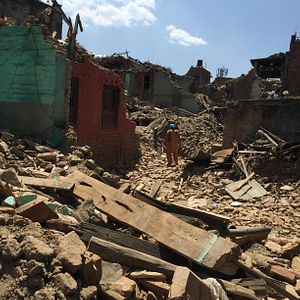Within six hours of the earthquake that struck Nepal on April 25, India sent men and materiel to aid in rescue efforts. By the next day, huge rescue teams had arrived, and Prime Minister Narendra Modi held an emergency cabinet meeting to plan India’s response. Indian media outlets were bullish about promoting New Delhi’s efforts. Nepali journalists also wrote favorably about India’s decisive response.
But just over a week later, the narrative has changed. There are murmurs of discontent in the Nepali media about India’s role in the rescue mission. Some are also upset about the conduct of the Indian media in covering the worst natural disaster to ever hit Nepal.
On Sunday, the hashtag #GoHomeIndianMedia began trending on Twitter, with thousands haranguing the Indian media over perceptions that its coverage had been jingoistic and insensitive. Critics back in India are also questioning the coverage, which has centered around New Delhi’s magnanimity toward Nepal in the wake of the disaster.
I received a barrage of complaints the moment I broached the subject in Kathmandu.
“If you are helping us, then why are you hyping it?” Rajesh Joshi, a member of the municipal government in the city’s Bhaktapur neighborhood, told me. “Why do you need to bring up the name of your prime minister and your country when you’re talking about the earthquake?”
He blames the Indian government for acting selfishly in the early days of the rescue operation. “India was more concerned with rescuing its own citizens than saving Nepali lives.” Joshi lost his house in the earthquake and has been living in a tent with his family for over a week.
Sharad Khatri, who heads Bhaktapur’s FM radio station, feels the same way. “We might be poor but we have our own sense of pride,” Khatri said. “The Indians were the first to come to our rescue, but they have hyped their contributions more than they’ve actually contributed.”
Most of the people I encountered in Kathmandu shared that feeling. Operation Maitri, launched by New Delhi to help Nepal and build stronger ties, seems to have backfired.
Why is anti-Indian sentiment so prevalent in Nepal?
According to Dr. Nishchal N. Pandey, director of the Center for South Asian Studies in Kathmandu, the attitude dates back to New Delhi’s blockade of Nepal in 1988 and 1989. “No petrol or kerosene could get into the country,” Pandey said. “The youth of that era are now settled in the U.S., U.K., and Australia, and are active on social media.”
Journalist Biswamani Pokharel, who writes for the Nepali daily Nagarik, thinks India’s intentions were good. “In the rush to provide aid, Narendra Modi didn’t think about latent anti-Indian feelings in Nepal,” Pokharel said. “Indian news coverage added fuel to the fire.”
This episode demonstrates the insularity of Indian media and Delhi’s dismissive toward its northern neighbor. India behaves like a big brother to Nepal, stoking distrust, and the media relays that message. Many Indian reporters in Nepal have never worked a foreign beat and seem oblivious of the political repercussions of the coverage. That implies that the media, just like the government, doesn’t care about what the Nepali people think.
The hashtag #GoHomeIndianMedia calls out that attitude.
Mallika Shakya, who teaches at South Asian University in New Delhi, said the sensational coverage is rooted in corporate support for Modi. “The anger we’re seeing on social media is against the corporate media and the corporatized state.”
India hopes to become a significant player in the international arena, but its media hasn’t helped, botching stories on India and Pakistan’s fractious relationship, and keeping reporters away from Afghanistan.
India’s parochialism is its biggest enemy as it vies for greatness. The P.R. fiasco in Nepal is a reminder that it’s time to grow up.

































